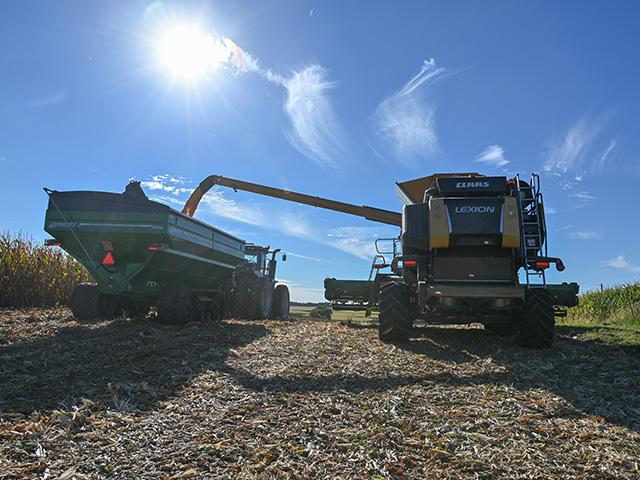Washington Insider-- Monday
IFPRI Says World Food Policies are Unsustainable
Here’s a quick monitor of Washington farm and trade policy issues from DTN’s well-placed observer.
GOP Lawmakers Voice Support for Lifting Cuba EmbargoSupport for lifting the Cuba trade embargo is being voiced by several congressional Republicans who recently joined President Barack Obama on his historic visit to the island nation, according to remarks lawmakers made to the Washington Post.
Though he does not believe the lifting the Cuba embargo will be “as easy or as quickly done as I think President Obama would like,” Rep. Reid Ribble, R-Wis., said he does see promise from “a new generation of Cuban leadership and a new generation of American leadership.” Ribble also noted that “[Cuban President] Raul Castro is still pretty dug-in on certain things that I know will not get past a Republican-held Congress.”
Opposition among the congressional Republican caucus will pose an obstacle to embargo-related reforms. Even House Speaker Paul Ryan, R-Wis., has voiced his opposition, despite having previously supported lifting the embargo.
A narrower and piecemeal approach to lifting the embargo could help overcome opposition, Ribble told the Post. He highlighted agricultural trade as a potential candidate for further liberalization. Ag trade can take place, but it has been hobbled by the requirement that transactions take place in cash with no financing allowed. Demands recently made by President Castro, such as payment of reparations by the U.S. on account of damage from the embargo, are likely to further antagonize Republican’s opposed to the regime and to lifting the embargo.
A full repeal of the embargo was voiced by other Republicans who participated in the Cuba visit. “What are we, going to try and live with this false belief that some part of the embargo has actually been valid?” Rep. Tom Emmer, R-Minn., said, arguing that full repeal was the better approach.
“The embargo has been the single greatest thing that contributed to [Fidel Castro’s] ability to consolidate and hold power for several decades,” Emmer told the Post, saying that “if it goes away, there are no more excuses, the government has to be responsible to its people.”
Support in the Senate for lifting the embargo has been consistently voiced by Sen. Jeff Flake, R-Ariz., and he says though that might be a heavy lift, he supports at least attempting to this year. He also noted his belief that the votes needed to lift the travel ban already exist in the Senate.
***
Campbell’s Soup Cans to Stop Using Bisphenol-A by Mid-2017U.S. soup manufacturer Campbell’s said that it will stop using Bisphenol-A (BPA) in cans by mid-2017, after the chemical was found in all 15 of its cans tested in a U.S. survey.
P[L1] D[0x0] M[300x250] OOP[F] ADUNIT[] T[]
Two-thirds of the nearly 200 food containers analyzed by the Ecology Centre in Michigan were found to contain BPA, with 70% of Del Monte tins testing positive and other companies’ tins turning in similar results. The endocrine disruptor was also found in tests of all three Carnation tins by Nestle. The study was commissioned by the U.S. Breast Cancer Fund and backed by other NGOs such as Canada’s Environmental Defense.
The debate about tolerable levels of exposure to BPA is ongoing.
In the study, the chemical was detected in soup can linings, from where it can potentially migrate into food. However, the study did not measure the quantities of BPA present in the polymer linings. Soup and gravy cans were the most likely tins found to contain BPA, while cans of corn and peas were the least. Milk cans were also very likely to be made with the chemical.
Bev Thorpe, one of the report’s authors, said that Campbell’s acted within days of receiving an advance copy of the study and reports indicate that Del Monte are doing the same.
“Our priority throughout this transition has been, and will continue to be, food safety,” said Mike Mulshine, packaging manager at Campbell’s. “We have tested and conducted trials with hundreds of alternatives to BPA lining and believe the acrylic and polyester options will ensure our food remains safe, affordable and tastes great.”
A spokeswoman for Nestle said: “Despite BPA being safe and posing no health risk to consumers, we have made a public commitment to remove it from our packaging materials. We have already eliminated BPA from our packaging for infant foods and are working towards completing the full transition of our product portfolio to non-BPA food contact packaging, where suitable safe alternatives exist.
***
Washington Insider: IFPRI Says World Food Policies are UnsustainableThe International Food Policy Research Institute (IFPRI) is one of Washington’s heavy hitters in the field of agricultural policy. It has a reputation of focusing on scholarship rather than politics and since 1975 has reported on national and international strategies and policies for meeting global food needs—especially for low-income countries and their poorer groups.
This year, IFPRI’s report notes that the UN’s Sustainable Development Goals include the eradication of hunger and undernutrition in 15 years or less, according to IFPRI Director General Shenggen Fan. However, the group’s current report concludes that meeting these goals will require “a new global food system that is efficient, inclusive, climate-smart, sustainable, nutrition- and health-driven, and business-friendly.” We are not now on track to meet those goals, IFPRI says.
Instead, the report says that the world is losing resources, with land area the size of Nicaragua lost to drought and desertification every year putting millions of small-scale farmers in Africa south of the Sahara at high risk. At the same time, IFPRI says, the world is promoting diets that are unsustainable and accelerating global warming.
As a result, nearly 800 million people are left hungry, one-third of the human race is malnourished, over half of some crops never make it to the table, and the planet is being ravaged from environmentally unfriendly practices. As the global population is expected to soar in the coming years, we must examine ways to feed more people efficiently and sustainably, while combatting climate change.
The report says that the food system accounts for one-fifth of all greenhouse gas emissions and calls for the development of “climate-ready” crops, which can lead to more efficient water use and improve our capacity to feed “our growing population and adapting and mitigating against climate change.”
Increasingly, urbanization, increasing incomes, and higher demand for animal protein is changing diets in developing countries especially for the most resource-intensive foods, including meats.
In addition, “most studies estimate that between 27%-32% of food produced never makes it to the table” IFPRI says. In developing countries, most food loss is at the production level—investments in infrastructure, transportation, and packing industries is key. In developed countries, most food is wasted at the retail and consumer level and consumers need to be educated about food availability and appearance to reduce food waste.
IFPRI also notes that women are less prepared to overcome climate change than men—and, that research suggests that while irrigation often allows men to increase production nearly enough to offset climate shocks, there are differences among the sexes in this regard and that removing those inequalities could reduce the number of undernourished people by up to 150 million.
The report notes that perhaps 85% of global water use is for irrigation and that new technologies such as “climate-ready” crops can greatly reduce this amount. Rice is the staple food of more than half of the world’s population and advanced varieties of rice, for example, can double water use efficiency and increase yields by almost 50%. Unless significant changes are made in global water consumption, most people will face severe water shortages by 2050, IFPRI says.
The report also features regional profiles of unique challenges facing Africa, Middle East & North Africa, Central Asia, South Asia, East Asia, and Latin America and the Caribbean.
It is hard to know exactly what to make of a report like this one. Mostly, the facts are well known and widely reported by national and international institutions, especially the UN, the World Bank and several others. The fact is, it is very hard to figure how to deal with a situation in which such a large share of the population is troubled by obesity at the same time some 800 million people suffer real hunger and in which significant resource loss and degradation continue to threaten productivity.
The first thing, of course, is to promote education about diets, better protections throughout the supply chain and better food choices by consumers. Certainly, the next obvious thing is better protection for resources, especially land, water and technology essential for efficiency and increased effectiveness.
One other “need” is to promote wider reliance on science—the research and development necessary for new techniques to limit climate change, identify better foods and practices with less waste. In recent years, food scare mongering based on ideas like the “precautionary principle” in Europe has led to frequently baseless challenges to science and created artificial barriers to better, safer foods that have been costly for producers and consumers alike. These have made it increasingly difficult to deal with food system problems in the past, and can be expected to persist and which producers should watch carefully as they emerge, Washington Insider believes.
Want to keep up with events in Washington and elsewhere throughout the day? See DTN Top Stories, our frequently updated summary of news developments of interest to producers. You can find DTN Top Stories in DTN Ag News, which is on the Main Menu on classic DTN products and on the News and Analysis Menu of DTN’s Professional and Producer products. DTN Top Stories is also on the home page and news home page of online.dtn.com. Subscribers of MyDTN.com should check out the US Ag Policy, US Farm Bill and DTN Ag News sections on their News Homepage.
If you have questions for DTN Washington Insider, please email edit@dtn.com
(GH/CZ)
Copyright 2016 DTN/The Progressive Farmer. All rights reserved.



